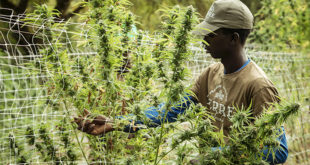
Tribal leaders approached the Nevada Legislature last week advocating for the state to allow marijuana industry operations to take place on tribal lands. The Senate Judiciary Committee heard from tribal leaders on Thursday. Many testified to poverty-like conditions within their communities and high rates of unemployment.
The leaders insist that the creation of jobs and revenue from legal marijuana operations on tribal lands would help their communities substantially, according to Reno Gazette-Journal. One of the biggest arguments is the lack of funds for necessary services such as law enforcement and health services. In the Fort McDermitt Paiute-Shoshone tribe, the unemployment rate is 98-percent.
Te-Moak Tribe of the Western Shoshone spokesman David Decker said, “We lack a tribal court system, we lack a police department, we lack health services – this may help create those services. Just to pay for dispatch, this is very expensive. This could help us pay for all those economic securities that we currently can’t provide.”
Tildon Smart, former chairman of the Fort McDermitt Paiute-Shoshone tribe said, “Education is a major issue. I left the reservation for a while and got an education and came back.”
Smart believes that the marijuana industry could bring about 200 new jobs to the community.
Senate Bill 375, introduced by Senator Tick Segerblom, would allow the marijuana industry to work with tribal councils to bring the industry to those communities.
Senator Segerblom said, “These tribes would oversee what is happening on their reservations, but when they participate in the system they would have to follow the state rules.”
Some tribes are only interested in opening dispensaries in their communities. Others wish for full operations from cultivation to sales. What may trump their chances is the state requirement to have available investment capital of $250,000. Washington State is the only one in the nation to work with tribes regarding marijuana businesses.
Segerblom also said, “They are sticking their necks out on this one, but at some point you have to say, ‘We can’t sit around and twiddle our thumbs.’” I think the tribes – because they’re sovereign nations – they will have a better leg to stand on.”
 Nevada Marijuana | NV Marijuana Nevada Marijuana News and Info
Nevada Marijuana | NV Marijuana Nevada Marijuana News and Info





